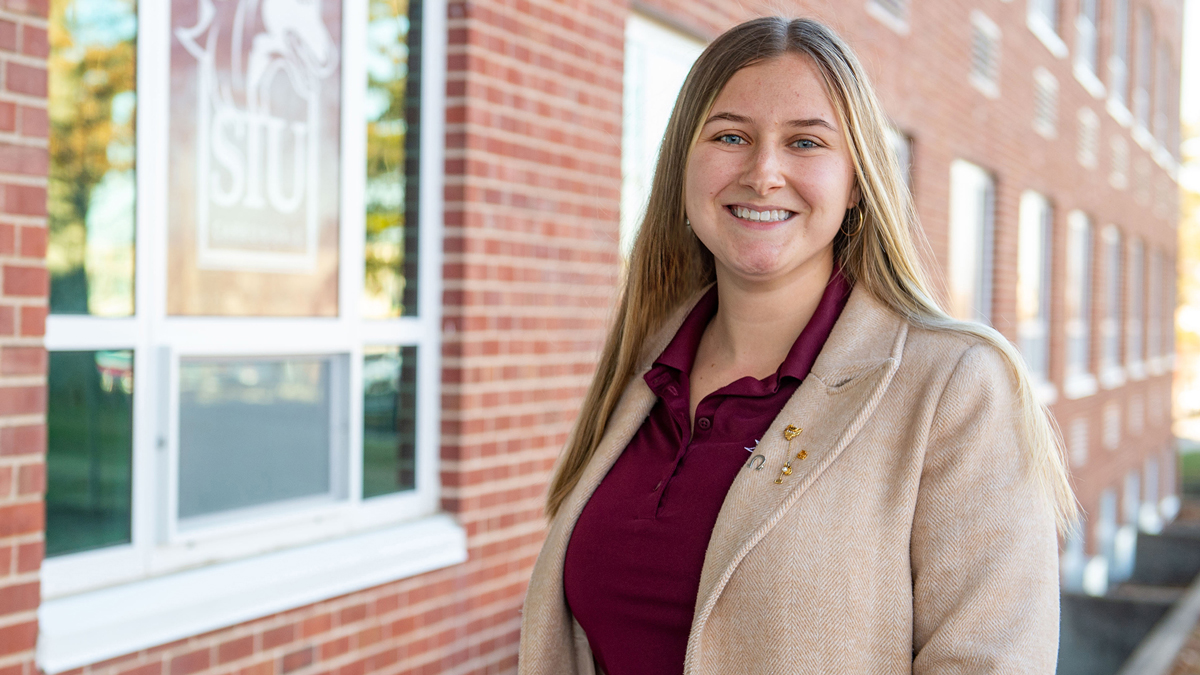
Photo by Russell Bailey
December 21, 2022
SIU student researches VR as a way to connect isolated older adults to the world
CARBONDALE, Ill. — Older adults, especially people in long-term care, have been one of the hardest hit populations throughout the COVID-19 pandemic, both physically and emotionally.
Arianna Goss, a Southern Illinois University Carbondale senior health care management major, saw firsthand the effects long-term care residents experienced due to the isolation and loneliness they’ve dealt with for safety reasons and decided to do something about it, using virtual reality to bring in at least part of the outside world to enhance their moods and mental health.
The research begins
Goss, a graduate of Newton High School from Sainte Marie, Illinois, said growing up she was very close to her grandparents and remembers visiting her grandfather when he was doing rehabilitation in a long-term care facility. She saw the jarring transition residents undergo as they move away from family, friends and what’s familiar to them. In the early days of the pandemic, many facilities were closed to outsiders as a safety measure, but residents became even more isolated.
Goss hatched a plan. She would help a group of residents in a Southern Illinois facility use VR headsets to take them on a visit to a beautiful, relaxing spot far away from their care center via a 360-degree video, assessing their moods, state of mind and feelings before and after.
There was a problem, though. As Goss interviewed the residents, she learned just over half of the 11 participants had heard of VR and only three had ever seen a headset before.
“They had some very real anxiety at first because they didn’t really understand the technology,” Goss said.
So, just as professional researchers do, she modified her plans. While maintaining COVID safety protocols, she first introduced participants to the technology in a user-friendly, fun way to help them become comfortable with VR and the possibilities it offers. Following the educational session, nine participants in the test group agreed to don the headsets to explore the virtual world. The other two declined because of specific health conditions.
The results
As the people began watching the video, something most amazing happened, according to Goss. They smiled and reacted quickly and favorably, expressing a sense of awe and “wow” at their immersive experiences.
“I enjoyed seeing their reactions as they experienced VR for the first time,” Goss said. “All of the comments recorded during the virtual reality experience were positive.”
She said several people were quick to say they wanted a headset of their own and one woman uttered, “This is so relaxing and too awesome for words.”
Another proclaimed, “It feels like I’m really there!”
She let the participants choose the type of video they wanted to watch. Some sought travel because that wasn’t part of their lives at the time. Others chose something else, such as a relaxing nature video. Afterward, virtually all said they had learned a lot about VR and a significant number, about half of the participants, reported increased feelings of happiness, peacefulness, relaxation, engagement and optimism.
Goss said that while she couldn’t quantify statistically significant changes in the residents’ moods before and after the experience on the Wilcoxon signed-rank test, a significant number noted improvements. She said because the study involved a small group, all women (because no men chose to come to the session), and there were other variables, such as the number of videos involved, she couldn’t definitively prove the value of VR. Nevertheless, all participants said they were more likely to try VR again, and Goss is confident that VR could have a meaningful and positive impact for long-term care residents if coupled with an educational session beforehand. In the future, she hopes to expand her research, which began as her Research-Enriched Academic Challenge (REACH) award project, by working with a larger, more diverse group of older adults, with all watching the same video.
Published while still an undergrad
Not just anyone can be a published author while still attending college, but Goss accomplished that feat due to her groundbreaking research on the “Feasibility of Virtual Reality for Mental Health in Long-term Care in Rural Populations.”
Published earlier this year in the “Journal of Aging and Long-term Care” the article is by Goss and Sandra Collins, professor and health care management program director, along with Jessica Cataldo, formerly at SIU and currently program director of health administration at Western Michigan University.
“Research in long-term facilities can be challenging, but Arianna navigated through the project like a seasoned professional,” Collins said.
The SIU experience
Goss has been a very busy Saluki during her time at SIU. Earning dean’s list recognition every semester, she also has minors in long-term care administration and health information/informatics management and communication.
Goss has also held leadership roles in a variety of campus organizations, including president of the Student Healthcare Management Association. A Chancellor’s Scholar, University Honors Program and REACH program participant, she is the 2021 winner of the Foster G. McGaw Scholarship from the Association of University Programs in Health Administration (ALPHA).
Goss never dreamed her college career would go the way it has.
“SIU has exposed me to so many opportunities I didn’t even know existed,” Goss said. “As a first-generation college student, I never thought I would want to do research. I struggled with research papers in English class before I came here. Now I’m a published author. If you have a passion to pursue research, the faculty will get you to that point. The professors are really great.”
Goss is currently completing an administrative internship at Parkway Manor of Liberty Village in Marion and for part of her time at SIU, also taught English as a second language remotely for Palfish in Beijing.
She is exploring her career options and looking at graduate school opportunities after earning her bachelor’s degree in May 2023.
